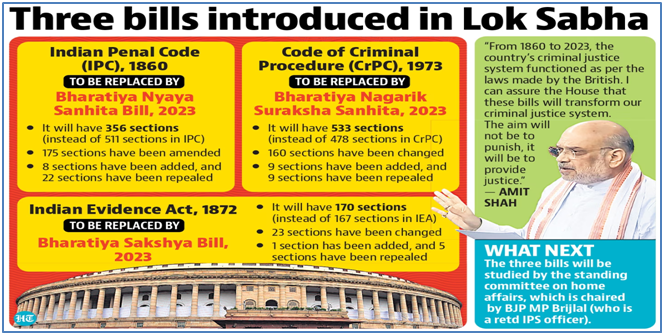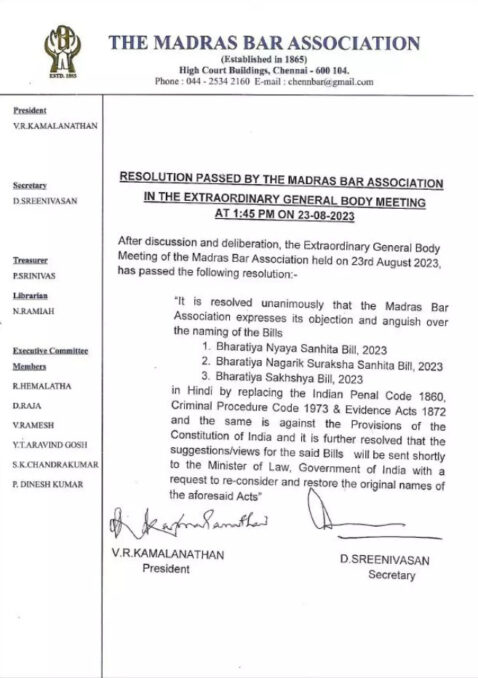In a significant development, the Madras Bar Association has taken a firm stance against the recent proposal to rename crucial legal statutes, expressing objections on constitutional grounds. The Association’s concern is centered around the proposed names for the bills that aim to replace the Indian Penal Code (IPC), Code of Criminal Procedure (CrPC), and the Indian Evidence Act. The bills, introduced by Union Home Minister Amit Shah, have ignited a debate on linguistic representation and adherence to constitutional principles.
“Bharatiya Nyaya Sanhita Bill”, “Bharatiya Nagarik Suraksha Sanhita Bill”, “Bharatiya Sakshya Bill”: A Linguistic Transition Constitution
The crux of the Association’s objection lies in the names chosen for the bills. The proposed titles, “Bharatiya Nyaya Sanhita Bill” for IPC, “Bharatiya Nagarik Suraksha Sanhita Bill” for CrPC, and “Bharatiya Sakshya Bill” for the Indian Evidence Act, reflect a shift from the English nomenclature to Hindi. This transition, while aiming to promote linguistic harmony, has sparked concerns over potential constitutional violations.

Constitutional Clash: Association Cites Violation of Provisions
According to the Madras Bar Association, the renaming of these pivotal legal acts in Hindi contradicts the constitutional ethos. The Association’s plea hinges on the premise that this change runs counter to the provisions enshrined in the Constitution of India, particularly those safeguarding linguistic diversity, cultural inclusivity, and equitable representation. The objection raised echoes a broader concern about maintaining the balance between linguistic identity and constitutional values.
English Names: A Continuity of Legal Tradition
The Association fervently advocates for the retention of the existing English names for the legal statutes. It contends that the long-standing usage of these names has not only become ingrained in the legal fraternity but also underscores India’s historical connection with English common law. This familiarity and adherence to established nomenclature ensure consistency in legal proceedings and scholarly discourse, thereby facilitating efficient communication within the legal ecosystem.
Political Prominence: Introduction of Bills and Subsequent Referral
The bills in question were introduced by Union Home Minister Amit Shah on the closing day of the Parliament’s Monsoon Session, August 11. The timing of the introduction added a layer of intrigue to an already charged debate. These proposals, now referred to the Parliamentary Standing Committee, are set to undergo a thorough evaluation. The Committee’s eventual recommendations will determine the fate of these proposed name changes and their alignment with constitutional principles.
Linguistic Diversity vs. Constitutional Values: A Delicate Balancing Act
The debate sparked by the Madras Bar Association’s objection encapsulates the delicate balance that India seeks to maintain between linguistic diversity and adherence to constitutional values. While the promotion of Hindi as a unifying language is laudable, it must be executed in a manner that respects the multifaceted linguistic tapestry of the nation. The association’s argument underscores the importance of interpreting linguistic changes within the broader context of constitutional norms.
Law Student Perspective: Learning Amidst Legal Evolution
From the perspective of law students, this debate offers a unique opportunity to witness legal evolution in real-time. It presents an illustration of how legal principles, including constitutional tenets, can be subject to interpretation and adaptation over time. By closely following this discourse, law students can gain insights into the nuanced intersection of language, culture, and the legal framework. Moreover, this situation encourages aspiring legal professionals to contemplate the impact of linguistic shifts on legal practice and the broader justice system.
Constitutional Imperative: An Enduring Guiding Light
At the heart of this controversy lies the guiding light of the Indian Constitution. As the supreme document that shapes the nation’s ethos, the Constitution serves as a reference point for resolving such debates. The Madras Bar Association’s objection highlights the Constitution’s role as a safeguard against potential infringements on linguistic and cultural rights. This episode serves as a reminder that any legal transformation must be undertaken while upholding the spirit of the Constitution.
Conclusion: A Matter of Constitutional Harmony
The Madras Bar Association’s resolution against the renaming of key legal statutes in Hindi reflects a broader concern about the balance between linguistic representation and constitutional harmony. The association’s appeal to retain the established English names underscores the need to preserve legal continuity while embracing linguistic diversity. As the bills await scrutiny by the Parliamentary Standing Committee, India watches closely to see how the nation navigates this intricate juncture where language and law converge, guided by the principles enshrined in its Constitution.













